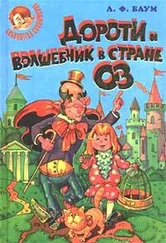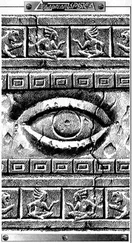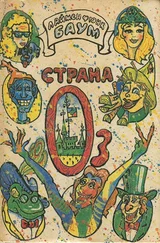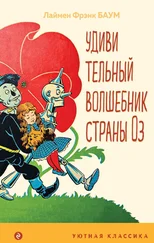| There were fewer houses and fewer fruit trees, and the farther they went the more dismal and lonesome the country became. |
Дома попадались реже и реже, да и фруктовых деревьев было поменьше. Чем дальше шли путники, тем глуше и мрачней становилась местность. |
| At noon they sat down by the roadside, near a little brook, and Dorothy opened her basket and got out some bread. She offered a piece to the Scarecrow, but he refused. |
В полдень они сделали привал у ручья. Дороти вынула из корзинки хлеб, предложила Страшиле, но тот отказался. |
| "I am never hungry, " he said, "and it is a lucky thing I am not, for my mouth is only painted, and if I should cut a hole in it so I could eat, the straw I am stuffed with would come out, and that would spoil the shape of my head. " |
- Я не знаю, что такое голод, - сказал он, - и это просто здорово. Мой рот нарисован красками, но если бы вместо этого в голове у меня проделали дырку, солома стала бы высыпаться и голова потеряла бы форму. |
| Dorothy saw at once that this was true, so she only nodded and went on eating her bread. |
Дороти понимающе кивнула и принялась уписывать хлеб за обе щеки. |
| "Tell me something about yourself and the country you came from, " said the Scarecrow, when she had finished her dinner. |
Когда она закончила свой обед. Страшила попросил рассказать ее о себе и своей стране. |
| So she told him all about Kansas, and how gray everything was there, and how the cyclone had carried her to this queer Land of Oz. |
Дороти рассказала ему о серых степях Канзаса, о том, как ураган забросил ее в эти далекие края. |
| The Scarecrow listened carefully, and said, |
Страшила внимательно слушал, а потом проговорил: |
| "I cannot understand why you should wish to leave this beautiful country and go back to the dry, gray place you call Kansas. " |
- Никак не могу взять в толк, почему тебе так хочется покинуть эту замечательную и прекрасную страну и вернуться в унылое, засушливое место, которое ты называешь Канзасом. |
| "That is because you have no brains" answered the girl. |
- Ты не можешь понять, потому что у тебя нет мозгов, - ответила девочка. |
| "No matter how dreary and gray our homes are, we people of flesh and blood would rather live there than in any other country, be it ever so beautiful. |
- Мы, люди из плоти и крови, любим жить у себя на родине, даже если есть страны и покрасивее. |
| There is no place like home. " |
Нет места лучше, чем родной дом. |
| The Scarecrow sighed. |
Страшила только вздохнул: |
| "Of course I cannot understand it, " he said. |
- Конечно, где уж мне вас понять. |
| "If your heads were stuffed with straw, like mine, you would probably all live in the beautiful places, and then Kansas would have no people at all. |
Если бы ваши головы, как моя, были набиты соломой, вы бы все отправились жить в прекрасные страны, а ваш Канзас совсем опустел бы. |
| It is fortunate for Kansas that you have brains. " |
Канзасу сильно повезло, что в нем живут люди с настоящими мозгами! |
| "Won't you tell me a story, while we are resting? " asked the child. |
- Может, ты тоже расскажешь о себе, пока мы еще не двинулись в путь? - спросила Дороти. |
| The Scarecrow looked at her reproachfully, and answered: |
Страшила взглянул на нее укоризненно. |
| "My life has been so short that I really know nothing whatever. |
- Ты же знаешь, я так недавно живу, что мне нечего и рассказывать. |
| I was only made day before yes-terday. |
Меня сделали только позавчера. |
| What happened in the world before that time is all unknown to me. |
Что было до моего рождения, я не знаю. |
| Luckily, when the farmer made my head, one of the first things he did was to paint my ears, so that I heard what was going on. |
К счастью, первое, что сделал мой хозяин-фермер, это нарисовал мне уши, и я стал слышать, что происходит вокруг. |
| There was another Munchkin with him, and the first thing I heard was the farmer saying, 'How do you like those ears?' |
С ним был другой Жевун, и фермер спросил его: - Как тебе уши? |
| "'They aren't straight,'" answered the other. |
- По-моему, получились криво, - отвечал тот. |
| "'Never mind,'" said the farmer. "'They are ears just the same,'" which was true enough. |
- Не беда, - отозвался фермер. - Главное, что это уши, а не что-то другое. Он был совершенно прав. |
| "'Now I'll make the eyes,'" said the farmer. |
- А теперь я нарисую глаза, - сказал мой хозяин. |
| So he painted my right eye, and as soon as it was fin-ished I found myself looking at him and at everything around me with a great deal of curiosity, for this was my first glimpse of the world. |
Сначала он нарисовал правый глаз, и, как только закончил работу, я стал с большим любопытством оглядывать его и озираться по сторонам. |
| "'That's a rather pretty eye,'" remarked the Munchkin who was watching the farmer. "'Blue paint is just the color for eyes.' |
- Неплохо! - похвалил фермера приятель, внимательно следивший за его работой. |
| "'I think I'll make the other a little bigger,'" said the farmer. |
- Голубой цвет очень подходит для глаз! |
| And when the second eye was done I could see much better than before. Then he made my nose and my mouth. |
- Второй глаз я, пожалуй, сделаю побольше, -задумчиво проговорил фермер, и, когда он нарисовал и его, я обнаружил, что вижу гораздо лучше. |
| But I did not speak, be-cause at that time I didn't know what a mouth was for. |
Затем он нарисовал мне нос и рот, но я тогда не заговорил, потому что не знал, для чего нужен рот. |
| I had the fun of watching them make my body and my arms and legs; and when they fastened on my head, at last, I felt very proud, for I thought I was just as good a man as anyone. |
Я с интересом смотрел, как они делали мое туловище, руки и ноги. Когда на туловище насадили голову, я очень загордился собой. Я решил, что выгляжу не хуже фермера и его приятеля. |
| "'This fellow will scare the crows fast enough,' said the farmer. He looks just like a man.' |
- Этот парень быстро распугает всех ворон, -заявил фермер. |
| "'Why, he is a man,' said the other, and I quite agreed with him. |
- Он очень похож на человека. - Вылитый человек, - согласился его приятель, и я подумал, что он прав. |
| The farmer carried me under his arm to the cornfield, and set me up on a tall stick, where you found me. |
Хозяин взял меня под мышку, отнес на кукурузное поле и посадил на шест. |
| He and his friend soon after walked away and left me alone. |
Потом они с приятелем ушли, а я остался один. |


![Агата Кристи - На краю [английский и русский параллельные тексты]](/books/32247/agata-kristi-na-krayu-anglijskij-i-russkij-paralle-thumb.webp)
![Сакс Ромер - Ведьмино отродье [английский и русский параллельные тексты]](/books/33237/saks-romer-vedmino-otrode-anglijskij-i-russkij-thumb.webp)
![Агата Кристи - Объявлено убийство [английский и русский параллельные тексты]](/books/33247/agata-kristi-obyavleno-ubijstvo-anglijskij-i-russ-thumb.webp)
![Фрэнсис Фицджеральд - По эту сторону рая [английский и русский параллельные тексты]](/books/34130/frensis-ficdzherald-po-etu-storonu-raya-anglijskij-thumb.webp)
![Мэри Райнхарт - Дверь [английский и русский параллельные тексты]](/books/34133/meri-rajnhart-dver-anglijskij-i-russkij-parallel-thumb.webp)


